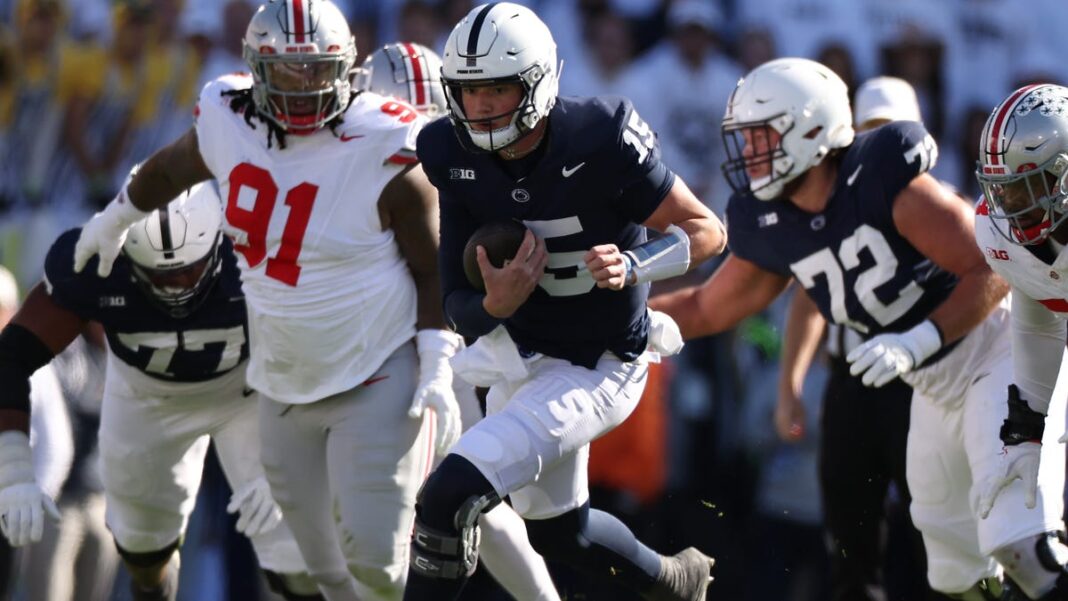Is it better to skip the conference title game? SEC and Big Ten scenarios suggest advantages
At golf tournaments held on dangerous courses, players often find the clubhouse to be the safest spot. They quickly record their score and leave the course to avoid worsening conditions that could hurt their standing.
A similar mindset is emerging in this first year of the 12-team College Football Playoff.
If a team, especially from the SEC or Big Ten, has built a solid playoff profile over 12 regular-season games, might it be wiser for that team to avoid the conference championship game? Competing in that extra game against a tough opponent could lead to a loss or injuries.
The CFP rules favor conference champions, awarding five automatic playoff places to conference champions and giving four of these teams a first-round bye.
Meanwhile, the runners-up from conferences are left to compete for one of the seven at-large bids.
A conference runner-up might have to play a total of 17 games to secure a national title. This raises the question: would a team fare better placing third in a strong conference and resting during the first weekend of December instead of risking a loss in a challenging championship game?
There is no guarantee that a conference runner-up will be treated fairly, and how the selection committee will view a team entering the championship game with a strong at-large resume, only to lose, is uncertain.
An extra loss could jeopardize a conference runner-up’s chances in the CFP or diminish their playoff ranking.
Members of the playoff committee evaluating these runners-up have no definitive guidelines to base their decisions on.
Is third place in the SEC or Big Ten preferable to second?
CFP executive director Rich Clark has stated that a conference runner-up won’t be “unfairly penalized,” yet he also indicated that their performance in the conference title game will be factored in.
“This will be taken into account properly,” Clark mentioned, “and the committee will handle it with sophistication.”
It’s worth pondering Terms like “unfairly,” “properly,” and “sophisticated” are vague and could be interpreted in various ways to justify the committee’s decisions and rankings.
“If the third-place team sits out and isn’t risking a loss in the championship game, the committee is smart enough to consider that,” Clark stated.
“Not all wins hold the same value, and likewise, not all losses are equal.”
This reasoning appears optimistic for SEC teams like LSU and Texas A&M.
All SEC teams have incurred at least one loss, and as many as seven of them could finish with a 10-2 record or better.
Both LSU and A&M have one conference loss but two overall. They could reach the SEC title game at 10-2 and then potentially face a third loss in Atlanta.
Would that additional loss exclude them from the playoff? Clark acknowledged that how the committee assesses a conference runner-up could depend on how they handle that loss.
In essence, it’s acceptable to lose, as long as it’s not a blowout while other conference contenders are resting.
“How did the runner-up perform in the championship game? The committee will review that,” Clark explained.
“They won’t gain extra points just for being in the championship game, but certainly, their journey to that game will be recognized since they must have had a strong season to get there. Their performance in that game will be assessed, but simply being in the game won’t weigh heavily in the decision.”
Bon appétit on that convoluted statement.
What Clark describes as a sophisticated approach could easily resemble a court that creates justifications as necessary to rationalize their choices.
The more I hear, the more it seems like aiming for an at-large spot and placing third in the SEC or Big Ten might just be the safest route—especially compared to risking a playoff berth through tiebreakers and being an underdog in the conference title game.
“You want the 5-seed,” says a coach regarding the CFP bracket
This issue regarding conference runner-ups has not gone unnoticed by coaches.
A coach from a Power Four conference, who wished to remain anonymous due to the sensitive nature of the topic, informed YSL News Sports that if his team holds at-large playoff qualifications come December, he would prefer to abstain from participating in the conference title game to avoid damaging his team’s résumé.
He prefers to let his team’s achievements speak for themselves and simply wait for playoff decisions rather than risking losses or injuries.
If his team doesn’t qualify for the conference championship, they miss out on a first-round bye. Nonetheless, the coach pointed out that being ranked fifth in the CFP bracket, as the top at-large team selected to host a playoff game, is still an attractive position.
Additionally, losing a conference championship match may not negatively affect their chances of securing the No. 5 seed.
“You want the 5-seed,” the coach explained, “because that means you will be facing the 12-seed,” which is likely to be a team from a Group of Five conference. Following that, “you’d go against the 4-seed, which is typically the weakest conference champion.”
In simpler terms: Finish third in a competitive conference, submit your achievements, and enjoy watching the conference championships on TV while relaxing at the “19th Hole.”

